Introduction To Bulgur Wheat And Couscous
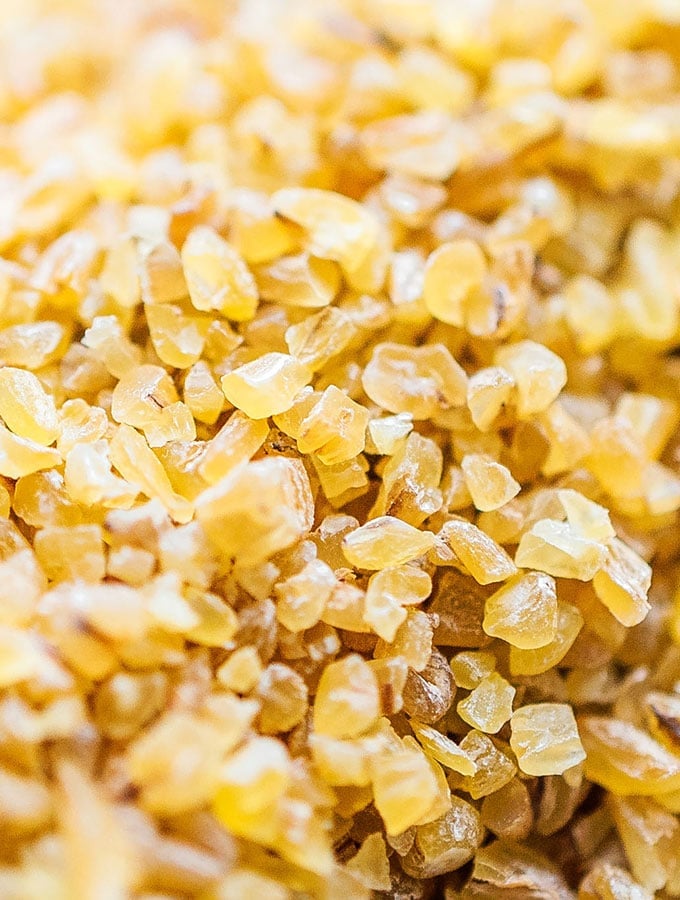
Bulgur wheat and couscous are two popular grains that have been a staple in many cuisines around the world.
Bulgur wheat is made from the whole grain of wheat, which is boiled, dried, and cracked to create a nutritious and quick-cooking grain. It has a chewy texture and a slightly nutty flavor.
Couscous, on the other hand, is not technically a grain but small granules made from durum wheat semolina. It is often used as a substitute for rice or pasta and has a light and fluffy texture.
In the following sections, we will delve into the nutritional value, cooking methods, taste and texture, culinary uses, and health benefits of both bulgur wheat and couscous.
Overview Of Bulgur Wheat And Couscous
Bulgur wheat and couscous are two popular grains with distinct characteristics. Bulgur wheat is made from the whole grain of wheat, whereas couscous is tiny granules made from semolina wheat flour. Bulgur wheat has a chewy texture and a nutty flavor, while couscous is light and fluffy. Both grains are versatile and can be used in various dishes. Bulgur wheat is known for its nutritional value, providing fiber, protein, and essential nutrients. Couscous, although not as nutrient-dense, is a quick and convenient option. Understanding the differences between these two grains can help in choosing the right grain for different culinary needs.
Nutritional Value Comparison Between Bulgur Wheat And Couscous
When comparing the nutritional value of Bulgur Wheat and Couscous, some differences arise. Bulgur wheat is known for its higher fiber content, with around 8 grams per cooked cup, compared to couscous, which only has about 2 grams. This higher fiber content in bulgur wheat promotes digestion and helps maintain a feeling of fullness. In terms of protein, both grains offer a similar amount, with about 5-6 grams per cooked cup. However, couscous tends to be lower in fat content. It’s important to consider these nutritional differences when choosing between bulgur wheat and couscous for your meals.
Cooking And Preparation
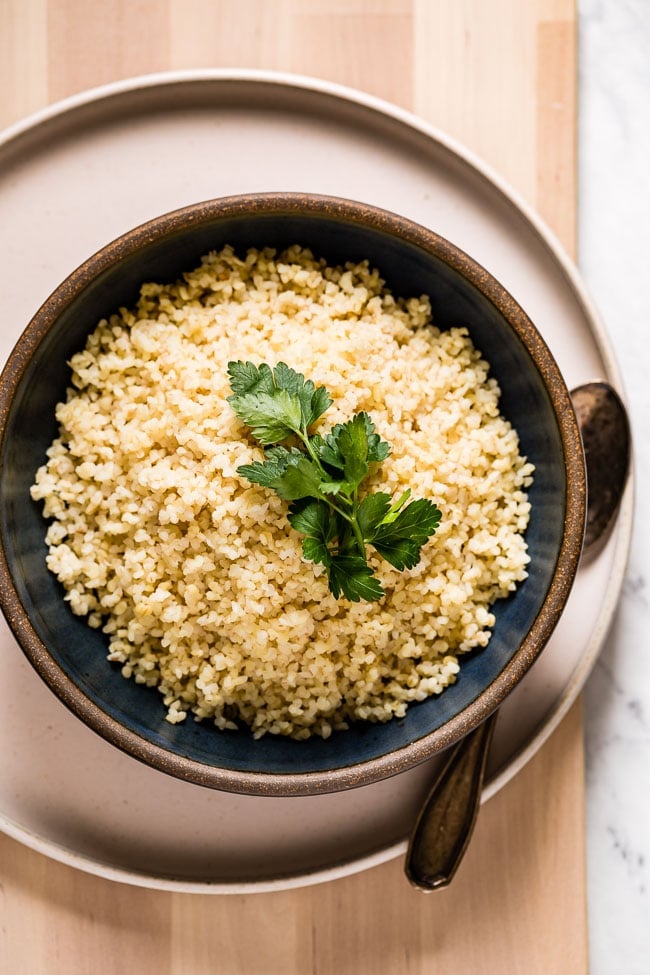
When it comes to cooking and preparation, Bulgur Wheat and Couscous both have their own methods.
For Bulgur Wheat, it is typically cooked by simmering it in water or broth until it becomes tender and fluffy. The cooking time can vary depending on the desired texture, with shorter cooking times resulting in a chewier grain.
Couscous, on the other hand, is usually steamed or soaked in hot water. It requires minimal cooking time and can be ready in just a few minutes. Simply pour hot water over couscous and let it sit until it absorbs the liquid and becomes light and fluffy.
Both grains can be easily incorporated into various dishes and cuisines, making them versatile options in the kitchen.
Methods Of Cooking Bulgur Wheat
Bulgur Wheat can be cooked using various methods, depending on personal preference and the desired texture.
One common method is to simmer Bulgur Wheat in water or broth until it becomes tender and fluffy. This can be done by combining one part Bulgur Wheat with two parts liquid in a pot, bringing it to a boil, and then reducing the heat to a simmer. Cook for about 10 to 15 minutes, or until the grains have absorbed the liquid and softened to the desired consistency.
Another option is to cook Bulgur Wheat in a rice cooker, using the same ratio of Bulgur Wheat to liquid. Simply add the grains and liquid to the rice cooker and let it cook according to the manufacturer’s instructions.
Overall, cooking Bulgur Wheat is a straightforward process that yields delicious results and adds a hearty element to any dish.
Techniques For Preparing Couscous
To prepare couscous, the most common technique is to steam it. Start by adding equal parts couscous and boiling water to a bowl. Cover the bowl tightly with plastic wrap or a lid and let it sit for about 5 minutes, allowing the couscous to absorb the moisture and soften. Afterward, fluff the couscous with a fork to separate the grains. Another method is to cook the couscous in a couscoussier, a special steaming pot, which ensures even cooking and a light, fluffy texture. Couscous can also be cooked like rice, by simmering it in a liquid until tender. Experiment with different techniques to find your preferred method of preparing couscous.
Taste And Texture
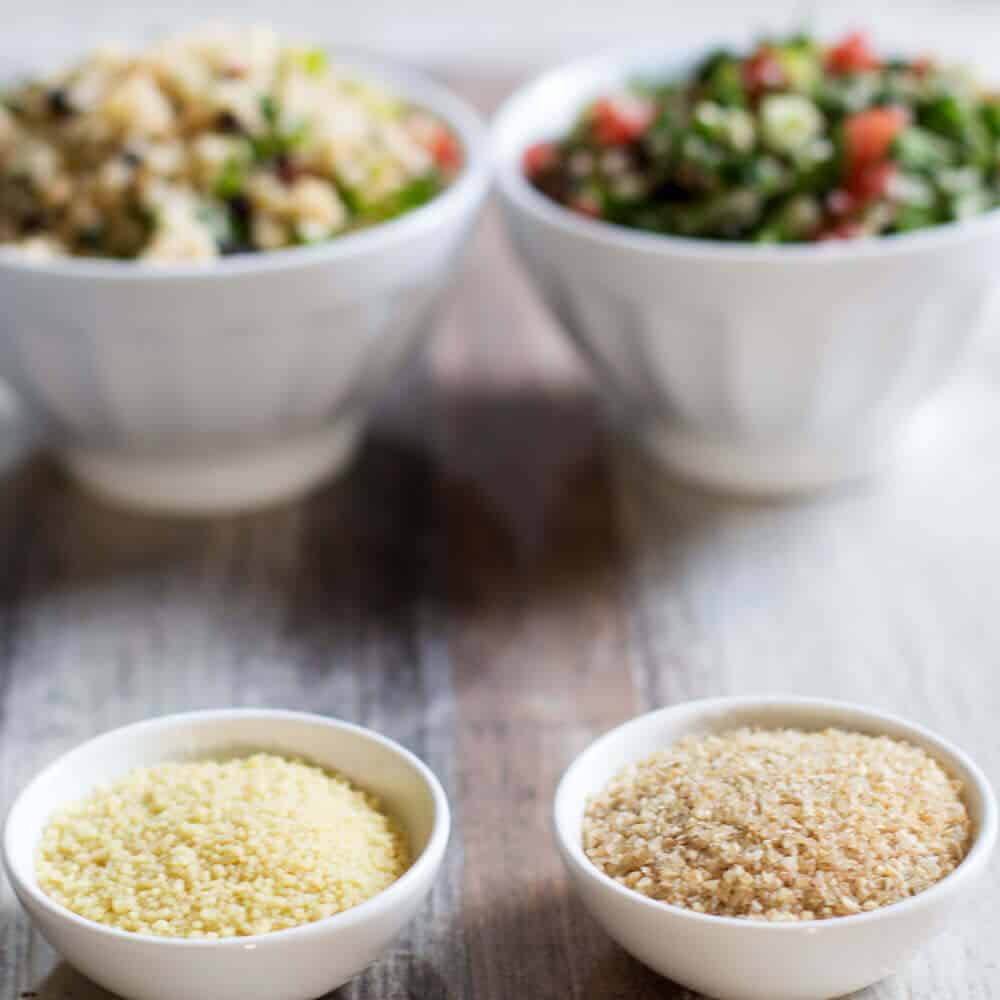
Bulgur wheat has a nutty and earthy flavor with a chewy texture. It has a slightly crunchy texture when cooked al dente, but can become softer and creamier when cooked longer. On the other hand, couscous has a milder flavor with a light and fluffy texture. It is often described as tender and delicate, with a subtle grainy texture. The texture of couscous is similar to rice or pasta, making it versatile for both savory and sweet dishes. Overall, the taste and texture of each grain can enhance a variety of dishes.
Flavor Profile Of Bulgur Wheat
Bulgur wheat has a distinct nutty and earthy flavor that adds a depth of taste to dishes. The nuttiness comes from the grain’s natural oils, which are released during cooking. This flavor profile pairs well with a variety of ingredients, making bulgur a versatile choice in both savory and sweet recipes. Its earthy undertones create a satisfying and wholesome taste, enhancing the overall flavor of dishes. Whether used in salads, stews, or pilafs, bulgur wheat adds a rich and hearty note to any meal.
Texture Comparison Between Bulgur Wheat And Couscous
When it comes to texture, Bulgur wheat and Couscous offer distinct differences. Bulgur wheat retains a pleasant chewiness and tenderness after cooking, making it ideal for dishes that require some bite. On the other hand, Couscous has a light and fluffy texture that readily absorbs flavors and sauces. It has a delicate and almost grainy texture that melts in your mouth. Whether you prefer the hearty texture of Bulgur or the airy fluffiness of Couscous, both grains offer unique experiences that can elevate your dishes to new levels of deliciousness.
Culinary Uses
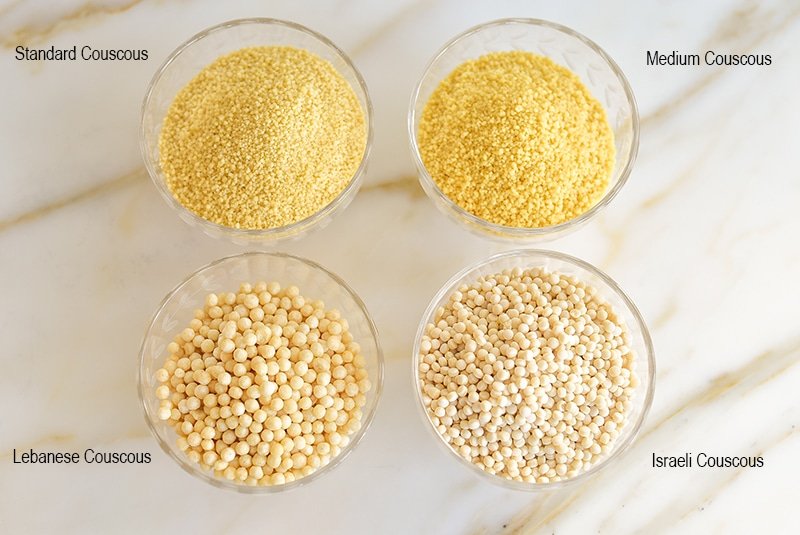
Bulgur wheat and couscous are both incredibly versatile grains that can be used in a variety of culinary dishes. Bulgur wheat is commonly used in Middle Eastern and Mediterranean cuisines to make traditional dishes such as tabbouleh, pilaf, and kibbeh. Its chewy texture and nutty flavor add depth to salads, stuffings, and soups. Couscous, on the other hand, is often used as a base for stews and curries, or simply steamed and served as a side dish. Its light and fluffy texture makes it an excellent choice for absorbing sauces and flavors. Whether you choose bulgur wheat or couscous, both grains bring unique qualities to your dishes and can elevate your culinary creations with their distinct flavors and textures.
Versatility Of Bulgur Wheat In Various Dishes
Bulgur wheat is incredibly versatile and can be used in a wide range of dishes. Its nutty flavor and chewy texture make it a perfect addition to salads, pilafs, and stuffings. Bulgur can be used as a base for delicious grain bowls or as a filling for vegetarian patties. It can also be cooked with vegetables and spices to create a flavorful and satisfying side dish. Whether you want to incorporate it into traditional Middle Eastern cuisine or experiment with different flavors, bulgur wheat is a fantastic ingredient that adds depth and substance to any dish.
Traditional And Modern Culinary Uses Of Couscous
Couscous has a rich culinary history and is used in various traditional dishes. It is a staple in North African cuisine, where it is often served with stews, tagines, and roasted meats. In the modern culinary scene, couscous has become popular in salads, as a side dish, and even in desserts. Its versatility allows it to be paired with a wide range of flavors, making it a great addition to both savory and sweet dishes. Whether it’s used as a base for a grain salad or as a substitute for rice, couscous adds a unique texture and flavor to any meal.
Health Benefits
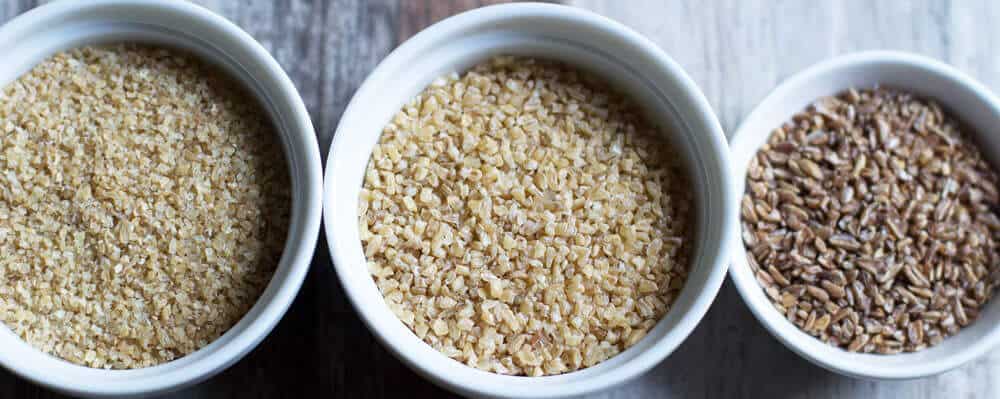
Bulgur wheat and couscous offer a range of health benefits. Bulgur wheat is a nutritious whole grain that is high in fiber, which aids in digestion and promotes a feeling of fullness. It is also rich in vitamins and minerals, such as manganese and magnesium, which support bone health. On the other hand, couscous is a good source of complex carbohydrates and provides energy for the body. It is low in fat and cholesterol, making it a healthy choice for those watching their weight and heart health. Incorporating these grains into your diet can contribute to overall well-being and support a balanced diet.
Health Benefits Of Consuming Bulgur Wheat
Bulgur wheat offers a range of health benefits. As a whole grain, it is high in fiber, promoting healthy digestion and aiding in weight management by keeping you feeling full for longer periods. It is also rich in essential nutrients such as manganese, magnesium, and iron, which support bone health and contribute to overall well-being. Additionally, the fiber in bulgur wheat helps regulate blood sugar levels and lowers the risk of developing type 2 diabetes. By incorporating bulgur wheat into your diet, you can enjoy these health benefits and enhance your overall nutritional intake.
Nutritional Benefits Of Including Couscous In Your Diet
Couscous offers several nutritional benefits that make it a valuable addition to your diet. It is a good source of carbohydrates, providing quick energy for your body. It also contains essential minerals like selenium and phosphorus, which support immune function and bone health. Additionally, couscous is low in fat and sodium, making it a heart-healthy option. With its high fiber content, it promotes healthy digestion and can help prevent constipation. Including couscous in your meals adds nutritional value and can contribute to a well-balanced diet.
Conclusion
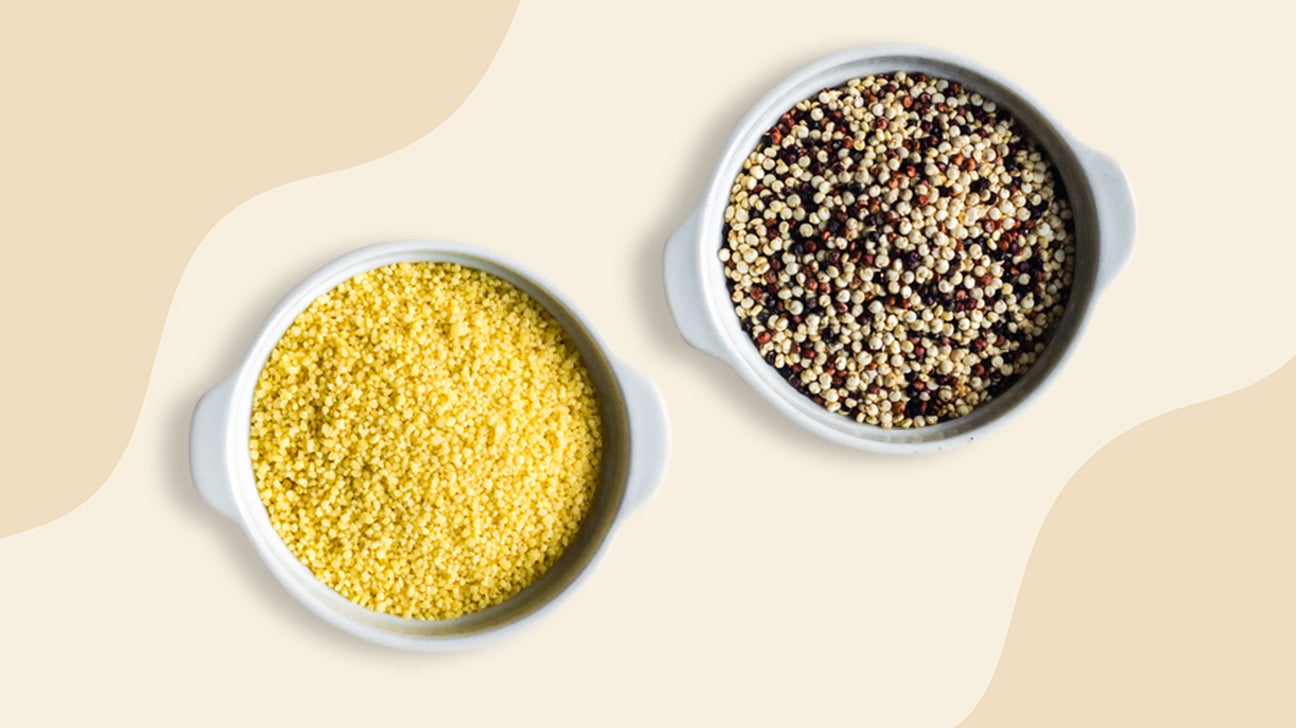
In conclusion, Bulgur wheat and couscous are both nutritious grains that offer unique characteristics and culinary versatility. Bulgur wheat provides a chewy texture and nutty flavor, making it a great option for savory dishes like pilafs and salads. On the other hand, couscous offers a light and fluffy texture, perfect for absorbing flavors in Moroccan and Mediterranean cuisine. Both grains can contribute to a well-balanced diet, providing essential minerals and fiber. Whether you prefer the heartiness of bulgur wheat or the delicate texture of couscous, incorporating these grains into your meals adds depth and variety to your culinary repertoire.
Final Thoughts On Bulgur Wheat Vs Couscous
In conclusion, Bulgur wheat and couscous are both nutritious grains that offer unique characteristics and culinary versatility. Bulgur wheat provides a chewy texture and nutty flavor, making it a great option for savory dishes like pilafs and salads. On the other hand, couscous offers a light and fluffy texture, perfect for absorbing flavors in Moroccan and Mediterranean cuisine. Both grains can contribute to a well-balanced diet, providing essential minerals and fiber. Whether you prefer the heartiness of bulgur wheat or the delicate texture of couscous, incorporating these grains into your meals adds depth and variety to your culinary repertoire.
Key Differences And Similarities Between The Two Grain Options
Bulgur wheat and couscous have distinct differences and similarities. Firstly, bulgur wheat is a whole grain made from cracked wheat kernels, while couscous is a pasta-like grain made from durum wheat. In terms of taste, bulgur wheat has a nutty flavor, while couscous is more neutral. Texturally, bulgur wheat is chewy, whereas couscous is light and fluffy. Both grains offer nutritional value, including fiber and minerals. Additionally, they are versatile in cooking and can be used in a variety of dishes. Overall, the choice between bulgur wheat and couscous depends on personal preference and culinary needs.
FAQ About Bulgur Wheat Vs Couscous: Grainy Delights Compared
Q: What is Bulgur Wheat?
A: Bulgur wheat is a whole grain made from cracked wheat that has been parboiled and dried. It is commonly used in Middle Eastern cuisine.
Q: What is Couscous?
A: Couscous is a type of small, steamed balls of semolina flour. It is a staple in North African cuisine, especially Moroccan dishes.
Q: How do Bulgur Wheat and Couscous differ in terms of preparation?
A: Bulgur wheat requires cooking in boiling water or broth, whereas couscous is typically prepared by steaming or soaking in hot water.
Q: What are the nutritional differences between Bulgur Wheat and Couscous?
A: Bulgur wheat is higher in fiber and protein compared to couscous. It also has a lower glycemic index, making it a better choice for blood sugar control.
Q: Can Bulgur Wheat and Couscous be used interchangeably in recipes?
A: While both grains can be used in a variety of dishes, their textures and flavors differ. Bulgur wheat has a chewier texture and nuttier flavor, whereas couscous is lighter and more delicate.
Q: Are Bulgur Wheat and Couscous gluten-free?
A: Neither Bulgur wheat nor couscous is gluten-free, as they both contain wheat gluten. Individuals with gluten sensitivities or celiac disease should avoid these grains.

Lenoir’s Bistro & Bakery, a charming and chic cafe, has been delighting patrons with an array of delectable delights since its inception. From mouthwatering breakfast bites to succulent burgers and sandwiches and a tempting selection of pasta, sides, and desserts, Lenoir’s Bistro & Bakery is the go-to destination for food enthusiasts seeking a delightful dining experience. Founded by a passionate culinary team with a vision to create a welcoming and stylish eatery, Lenoir’s Bistro & Bakery has seamlessly blended the art of baking with the craft of preparing savory dishes. The result is a menu that caters to diverse tastes and preferences, offering something to satisfy every craving.